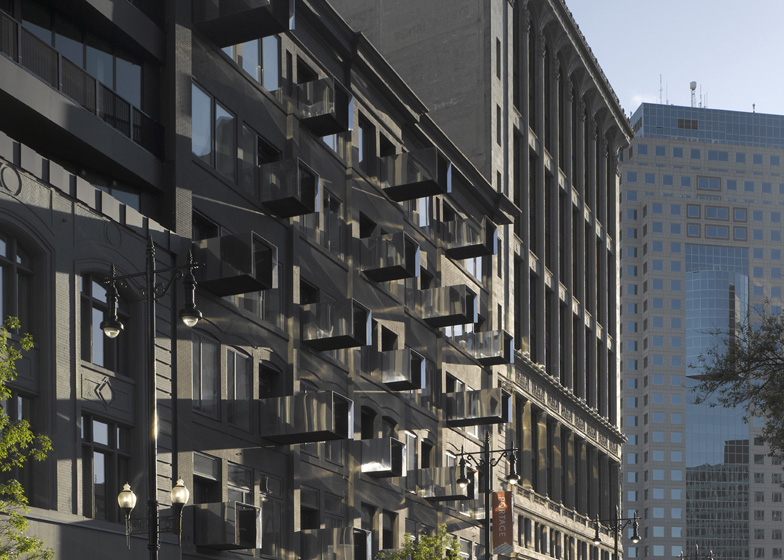Two commercial buildings in Winnipeg have been converted into an apartment block with mirrored balconies that stick out like open drawers.
Constructed at the start of the twentieth century, the Hample and Avenue Buildings occupy a prominent position on Portage Avenue. They once housed shops and offices but had stood empty since the 1990s.
The renovation by 5468796 Architecture involved upgrading the ground floor of both buildings for commercial use and adapting the upper floors to accommodate 75 rental apartments. At just three storeys, the Hample Building was half as tall as the Avenue Building, so the architects also added extra storeys to bring the two buildings into line.
Steel balconies cantilever through existing window openings for 20 of the apartments. Each one is clad in mirrored aluminium and has a see-through gridded base.
"A series of formally simple moves dramatically transform the original facades, shifting public perception of the buildings from eyesores to a unified urban landmark," say the architects.
At ground floor level, a mirrored canopy gives shelter to two different entrances. Stretching across the facade of both buildings, the volume is intended to unite the two structures.
The first entrance leads though the glazed shopfront facade into the large ground floor unit, which is currently occupied by a charity organisation.
The second entrance is dedicated to residents, who are led through a V-shaped recess into a stairwell at the centre of the building.
Similar renovation projects on Dezeen include the overhaul of a crumbling tower block in Paris and an upgrade of an office block in Milan. See more architectural renovations.
Here's some more text from 5468796 Architecture:
The Avenue on Portage by 5468796 Architecture
The Avenue on Portage revives two historic commercial buildings from the turn of the century located one block west of Winnipeg's most famous corner, Portage and Main. Once major retail destinations in the city, the Avenue and Hample Buildings experienced a slow decline, becoming blights to the street and downtown. In 2010 the client purchased the site to develop the derelict properties into 75 rental apartments and 22,500 square feet of commercial space.
A series of formally simple moves dramatically transform the original facades, shifting public perception of the buildings from eyesores to a unified urban landmark. Hovering above the sidewalk, steel balconies cantilever from existing window openings and provide outdoor access for apartment dwellers. Clad in mirror-finish aluminium, the balconies become camouflaged against their surroundings, reflecting at turns the sky, the façade and the street below.
While the balconies push residents out beyond the façade, the main floor pulls pedestrians in, softening the boundary between the public streetscape and the private interiors. Inside, apartments sized between 430 and 1020 s.f. fill the upper four floors of the Avenue, as well as a new, three-storey addition to the Hample.
In order to address the deep building footprint and provide windows for interior units, two existing light wells are carried down through all residential floors, while a third is extended into the new addition.
The main floor is occupied by Manitoba Start, a non-profit organisation that provides services for new immigrants in Winnipeg. At street level a wall of glass folds back into the building to create a deep, V shaped entrance that broadens the width of the sidewalk.
Overhead, a faceted, mirror-finish canopy angles outward 13 feet from the face of the Hample before returning to meet the edge of the Avenue, unifying the two facades. Together, these elements draw the city into the building's expression, making it an active participant in the life of the street.

